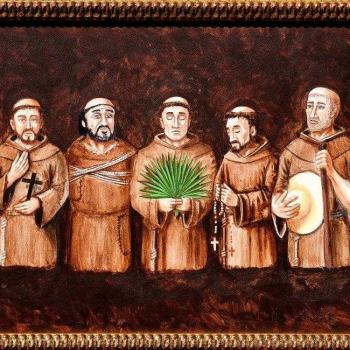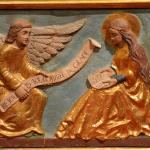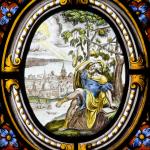I had never seen a depiction of a human being and a dinosaur that implied that both species inhabited the Earth simultaneously until I watched the movie
Religulous two weeks ago.
The picture above is from the Creation Museum in Kentucky which Bill Maher visits while filming his movie Religulous. I do not recommend watching this movie since it borders on blasphemy and certainly insults people of faith, but the movie accurately portrays the flaws of Young Earth Creationism advocated mostly by Fundamentalist Christians.
While criticizing Young Earth Creationism (which I will do later in this post), Bill Maher interviews Father George Coyne, a former director of the Vatican Observatory. From what I watched of the movie (I did not watch it all), this priest is the only man of faith portrayed favorably by Maher. My Latin professor from seminary is also interviewed by Maher and shown in a somewhat positive light, but my professor is crazy!
Criticizing evolution deniers, Father Coyne states, “the reason [evolution is true] is simply historical fact. I mean, John Paul II for instance said evolution in the neo-Darwinian sense is no longer a mere hypothesis.”
Coyne continues, “the Christian Scriptures were written between about 2000 years before Christ to about 200 years after Christ. Modern science came to be with Galileo up through Newton, up through Einstein. What we know as modern science is in that period. How in the world could there be any science in Scripture? There cannot be. Just the two historical periods are separated by so much. The Scriptures are not teaching science. It’s very hard for me to accept not just a literal interpretation of Scripture but a fundamentalist approach to religious belief. It presents itself as science and it’s not.”
There are two issues at hand here, I will discuss both.
I. What is Creationism?
II. Did Biblical writers intend to be science teachers?
I. As Catholics we believe God created the world, we are creationists. Yet, creationism can be understood in three distinct ways.
1.
Young Earth Creationism: Espoused mostly by fundamentalist Christians who believe the world was created literally in six twenty-four hour periods by God as narrated in the Book of Genesis and the Earth is only about 6,000 years old. My sixth grade science teacher in public school in 1993, after teaching us about evolution, drew a timeline on the board explaining this is how it really happened.
This fundamentalist and literal view leads to an unreconcilable conflict between science and religion. Believers feel they must choose between faith and science. The two possible results: believers who believe stupid things in regards to science in order to maintain their literal religious views (such as believing that humans and dinosaurs coexisted on earth or that dinosaur bones were placed by Satan to confuse humans) or nonbelievers who believe people of faith are irrational.
2.
Creationism Proper: Espoused by the Catholic Church, belief that the Earth was created by God billions of years ago and that God has and continues to uphold it through his providence overseeing all natural processes including evolution through natural selection. This view recognizes that faith and reason cannot contradict each other. The God who creates and sustains the universe is the same God who has revealed himself most perfectly in Jesus Christ, so there cannot be any contradiction between science and revelation.
Scientific discoveries regarding the Earth must be compatible with our belief in God. The world is not 6,000 years old, but rather the age science indicates. This view holds that data compiled by scientists regarding the age and development of life on Earth is accurate while maintaining the presence and involvement of God in the process.
3.
Molding Creationism: This is a vague concept of creationism where matter is preexisting and is only given form or molded by God. This is a God who did not create out of nothing, hence not the Judeo-Christian God. At times it has been referred to as the God of the philosophers since ancient Greeks believed it was impossible to prove by reason alone that the Earth had been created at any given point in time. Saint Thomas Aquinas himself said that if it wasn’t for divine revelation, we would not be able to tell by reason alone that the Earth had a beginning.
II. As Catholics we believe God created the world, but we do not read the Book of Genesis literally. We must realize the Bible is not a science textbook, but rather the Bible teaches us truths of our faith. The Book of Genesis teaches us God created the universe and he created it good. The Book of Genesis is not science, but rather a book that teaches religious truths revealing creation in a beautiful narrative.
If we search in the Bible for scientific knowledge according to the parameters of modern science laid out by Galileo, Newton and Einstein, we will not find science. The Bible teaches real knowledge, but it is not presented in a modern-scientific manner. This is what Father Coyne from the Vatican Observatory is hinting at with his words.
We cannot be afraid thinking science will somehow discredit our faith. Truth is truth wherever it is found, and the Truth is Jesus Christ. We cannot therefore be afraid of the truth in science, because in the end, it will be compatible with Jesus Christ, who is the Truth. The Catholic Church shows this courage in its interest in science. Even the person who first proposed the Big Bang Theory, Georges Lamaitre, was a Catholic priest!
Though I disagree wholeheartedly with Bill Maher’s cynicism and agnosticism, I applaud him for pointing out the inconsistencies and flaws of those who read the Book of Genesis literally. Advocates of Young Earth Creationism are more of a burden for people of faith than any kind of help because they portray a Christianity that is irrational and not grounded on solid Truth.















